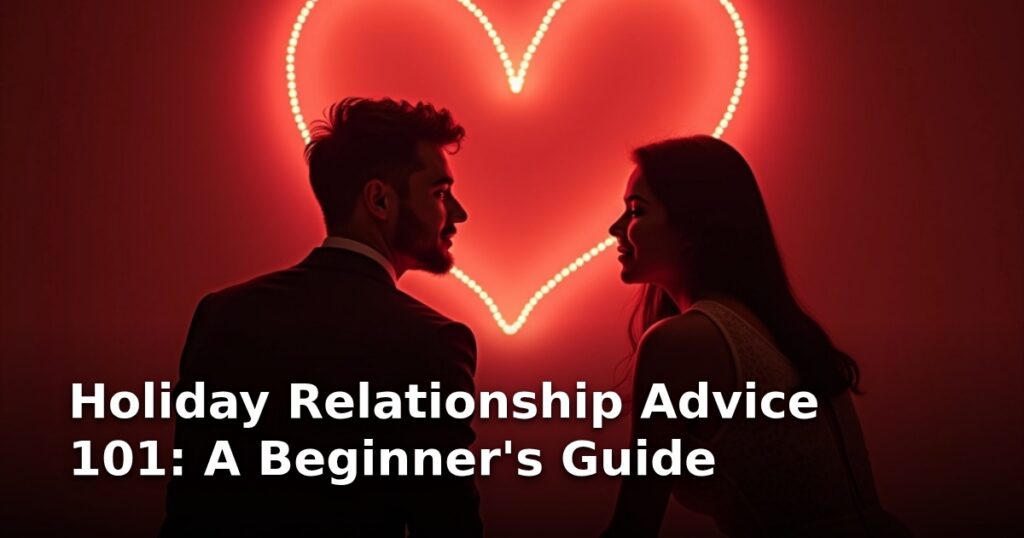Holiday Relationship Advice 101: A Beginner's Guide
The holiday season often brings a unique blend of joy, excitement, and unexpected stress. For those navigating relationships—whether newly formed or long-standing—this time of year can feel like a high-stakes test. This comprehensive guide offers essential holiday relationship advice 101 for beginners, designed to help you foster connection rather than conflict during this busy season. We will cover foundational concepts, practical steps, and how to manage common pressures so you can enjoy the festivities with peace of mind.
What is Holiday Relationship Advice?
In simple terms, holiday relationship advice refers to the proactive strategies couples use to maintain connection, manage increased external pressures, and navigate differing expectations during the concentrated period between Thanksgiving and the New Year. It is not about fixing major problems; rather, it’s about applying basic relationship maintenance skills when your schedules and stress levels are at their peak. Think of it as preventative maintenance for your partnership, ensuring the engine runs smoothly even when the road gets bumpy.
Why This Matters for Beginners
If you are new to a relationship, or simply new to managing the intensity of the holidays with a partner, understanding these foundational elements is crucial. The holidays introduce variables you might not encounter during the rest of the year: travel, financial strain, crowded social calendars, and the intense scrutiny of family dynamics. Without a plan, these variables can easily erode the positive feelings you share. Mastering these basics now sets a positive precedent for future years.
Basic Definitions and Essential Terminology Explained
Before diving into specific strategies, let’s define a few core concepts that form the bedrock of healthy holiday interactions.
Effective Communication in Marriage (and Partnerships)
Effective communication in marriage (or any committed partnership) is more than just talking; it’s about ensuring the message sent is the message received. For beginners, this means practicing active listening. Active listening involves putting away distractions, making eye contact, and summarizing what your partner said before offering your own viewpoint. For example, instead of immediately defending yourself when a schedule conflict arises, try saying, "It sounds like you are feeling overwhelmed by our three events next week. Is that right?"

Managing In-Law Relationship Stress
The concept of managing in-law relationship stress addresses the unique challenge presented when blending lives, traditions, and expectations involving extended family. This stress often arises from unspoken rules about hosting, gift-giving, or holiday observance. For beginners, the key concept here is presenting a united front. Even if you and your partner have different comfort levels with their respective families, agreeing on boundaries before an event is vital.
Staying Connected During Stressful Work Periods
The end of the year often coincides with increased professional demands. Staying connected during stressful work periods requires intentional effort. This doesn't mean long conversations; it means micro-moments of connection. These are brief, genuine check-ins—a five-minute hug before rushing out the door, or a text midday saying, "Thinking of you, hang in there." These small acts signal that your partner remains a priority despite the chaos.
Getting Started: Your First Steps in Holiday Harmony
For the absolute beginner, start with these three actionable steps. Do not try to overhaul your entire holiday routine at once; focus on foundational alignment.
Step 1: The "State of the Union" Meeting (The Planning Phase)
Schedule a dedicated, non-rushed time—perhaps over coffee the first weekend of December—to discuss logistics. This meeting should cover:
- Boundaries: How much family time is too much? Are there specific events you must attend, and which ones can you respectfully skip?
- Budget: Money is a significant stressor. Agree on a joint spending limit for gifts and travel before you start shopping.
- Traditions: What traditions from your past are non-negotiable for you? What traditions is your partner eager to introduce? Find one tradition to honor from each side.
Step 2: Mastering the Art of the "No"

A common beginner mistake is overcommitting. You feel obligated to attend every party or accept every invitation. Learning to say "no" gracefully is critical for preserving your energy as a couple. Practice simple scripts: "That sounds lovely, but we already have a commitment that evening. Thank you so much for thinking of us!" Remember, saying no to an event is saying yes to your relationship health.
Step 3: Scheduling Non-Negotiable Connection Time
If your schedule is packed, you must schedule intimacy and relaxation. This could be a "No Phones After 9 PM" rule, or blocking out two hours every Sunday morning just for the two of you to relax together, regardless of what else is happening. This scheduled downtime is essential for staying connected during stressful work periods and family visits.
Common Beginner Mistakes to Avoid
Even with the best intentions, beginners often fall into predictable pitfalls. Awareness is the first step toward avoidance.
Mistake 1: Assuming Shared Expectations
Never assume your partner wants the same level of holiday immersion you do. One person might envision a quiet Christmas morning, while the other expects a full day of hosting relatives. If you don't discuss expectations, you are setting yourselves up for disappointment. Always clarify the vision.
Mistake 2: Letting In-Law Stress Boil Over Unaddressed
When managing in-law relationship stress, beginners often let frustrations simmer until a minor comment triggers a major argument between partners. If your partner’s mother says something irritating, do not unleash that frustration on your partner later. Instead, use effective communication in marriage techniques: "When your mother mentioned X earlier, I felt Y. Can we discuss how we handle comments like that moving forward?"
Mistake 3: Forgetting the "Why"

When you are exhausted from shopping and traveling, it is easy to forget that the holidays are supposed to be enjoyable. If you find yourselves snapping at each other, pause and reconnect with the reason you are doing all this—celebrating your partnership and the life you are building together.
Next Steps for Growth and New Year Momentum
Once the holiday rush subsides, use the momentum of your successful navigation to plan for the future. This is where the transition into dating advice for the new year naturally begins.
Review and Recommit
Take a moment in January to briefly review the holiday season. What worked well? What caused the most friction? Acknowledge the efforts you both made. This review helps solidify positive habits.
Implement New Year Dating Habits
The New Year is the perfect time to commit to better dating habits, especially if the holidays left you feeling disconnected. Dating advice for the new year emphasizes consistency over grand gestures. If you managed to schedule connection time during the holidays, make a commitment to maintain a "Date Night Minimum" (e.g., one dedicated evening every two weeks) throughout the year. This ensures that the communication skills you practiced under pressure become routine.
Conclusion: Building a Foundation of Connection
Navigating the holidays as a couple, especially for beginners, requires intention, clear boundaries, and a commitment to effective communication in marriage. By proactively addressing logistics, managing family dynamics, and prioritizing your connection, you can transform potential stress points into opportunities for deeper bonding. Remember that every successful holiday season you navigate together builds resilience. Embrace the season with patience, practice these foundational steps, and look forward to a connected and joyful new year.



